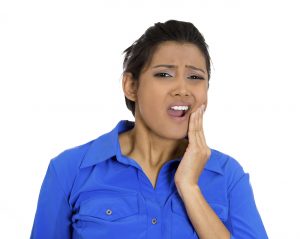 When you’re talking to a friend or eating dinner, do you ever think about the mechanics involved in making that happen? In summary, there are hinges located just in front of your ears that allow you to open, close and move your jaw so you can happily have a conversation and enjoy a good meal. That hinge is called your temporomandibular joint, or TMJ for short. Fortunately, most people don’t need to think about this joint because it functions properly. However, for those who have TMD, or temporomandibular joint disorder, the symptoms can be quite problematic. Fortunately, there is a solution. Dr. Bobby Carmen offers TMJ therapy in Moore, OK, so sufferers don’t need to think about their TMJ anymore.
When you’re talking to a friend or eating dinner, do you ever think about the mechanics involved in making that happen? In summary, there are hinges located just in front of your ears that allow you to open, close and move your jaw so you can happily have a conversation and enjoy a good meal. That hinge is called your temporomandibular joint, or TMJ for short. Fortunately, most people don’t need to think about this joint because it functions properly. However, for those who have TMD, or temporomandibular joint disorder, the symptoms can be quite problematic. Fortunately, there is a solution. Dr. Bobby Carmen offers TMJ therapy in Moore, OK, so sufferers don’t need to think about their TMJ anymore.
Why Do I Have TMD?
Dentists and doctors aren’t entirely certain what causes TMD to develop. Some possibilities are problems with the muscles of your jaw or the construction of the joint itself; teeth grinding and clenching, which place unnatural pressure on these joints; arthritis in your TMJ; and stress.
Signs and Symptoms of TMD
Unfortunately, the most frequent symptom of TMD is pain that usually occurs when you open or close your mouth while talking, chewing, laughing or yawning. The degree of pain ranges from moderate to severe.
Other common symptoms include:
- A clicking or popping sound when you open your mouth
- Feeling as if you jaw becomes locked in an open or closed position
- Pain in your ear, neck or shoulders
- Swelling along the side of your face
- Difficulty chewing
- Feeling as if your facial muscles have weakened
TMJ Therapy
Because of these uncomfortable symptoms as well as the possibility that TMJ can lead to tooth damage, Dr. Carmen will check your jaw for signs of TMD at each one of your biannually scheduled dental cleanings and exams. TMJ therapy may include prescribing a custom-fitted oral appliance that you’ll wear while you sleep each night. Often called a nightguard, this comfortable appliance shields your upper and lower molars from the pressure of teeth grinding. Other home remedies include:
- Gently massaging the joint to relax the muscle and stimulate circulation
- Yoga to reduce the effects of stress
- Taking smaller bites when you eat
- Eating on both sides of your mouth
- Ibuprofen or acetaminophen
Call Our Office Today
If you are experiencing any of the warning signs of TMD listed above, then please call the office of Dr. Carmen in Norman, OK. Patients from Moore, the University of Oklahoma, Central Oklahoma, and beyond visit us for quality dental care.
